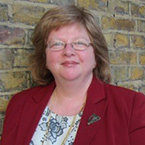Ask the women in your lives if they have had their cervical screening test.
The consequences of cervical cancer may be preventable but it does rely on early detection and screening. Sadly, we know many women may not attend screening, it could just be personal concerns about the process rather than what it might find.
It is estimated that if everyone attended screening regularly, 83% of cervical cancer cases could be prevented. At present, the national uptake falls below that level and women living in the most socioeconomically deprived communities are around 10% less likely to take up the offer of cervical screening compared with women in the most affluent areas.
Worryingly there is evidence that women with a physical disability experience significant barriers when accessing screening, resulting in up to a third lower uptake. Pre-existing disability is associated with a higher risk of breast and cervical cancer and women with disabilities, particularly severe disabilities, are diagnosed at later stages, receive less treatment, and have a higher risk of mortality. There is also emerging evidence that women with autism may also experience significant difficulties when accessing screening.
We know that one of the reasons people may not attend a screening is because they might be concerned about what is going to happen, or even about what the results may show. This is entirely reasonable and perfectly understandable. Nobody likes medical examinations but the nursing staff that lead the screening programmes are ready to answer questions and will be there to support women and their families every step of the way Continuity of care is so valuable in screening programmes, and we support the need for nurses to be able to follow their patients through on these journeys.
The Royal College of Nursing has now published a resource for clinical staff to help them support women through the whole process. One of the key roles of all healthcare professionals is to listen to women and work collaboratively to achieve the best outcome for them. It is the responsibility of nurses to interpret the needs of the person in front of them, taking account of verbal and non-verbal cues that may suggest anxiety, stress or a lack of understanding. It is also important to acknowledge that the woman herself will have the best understanding of her own abilities and the support she needs to cope with a different/ difficult environment.
Our guidance provides information on the kinds of questions nursing staff could ask to get the best information from their patients and also to help put at ease those who may have concerns. There is a good practice checklist to help nursing staff who are guiding women through the screening process.
Put simply the clinical guidance is designed to encourage and facilitate the uptake of cervical screening, particularly for those who have a physical disability and those who are autistic. When researching the work, it was noted that there are a range of useful leaflets and resources available for supporting women with learning disabilities to better understand cervical screening, and some of these have been listed at the end of the guidance.
Together with organisations like the Faculty of Sexual and Reproductive Health Hatfield Vision and Eve Appeal, we are determined highlight the barriers and champion best practice that will enable more women to access vital and often life-saving screening and reduce the numbers of preventable cervical cancer cases across the UK.
If anyone has any concerns, I encourage them to speak to their practice nurse who will be ready to help with any questions or concerns. Please do not keep it to yourself, you are not alone.
Read our guidance - Cervical screening for physically disabled women and autistic women


 Share on LinkedIn
Share on LinkedIn




